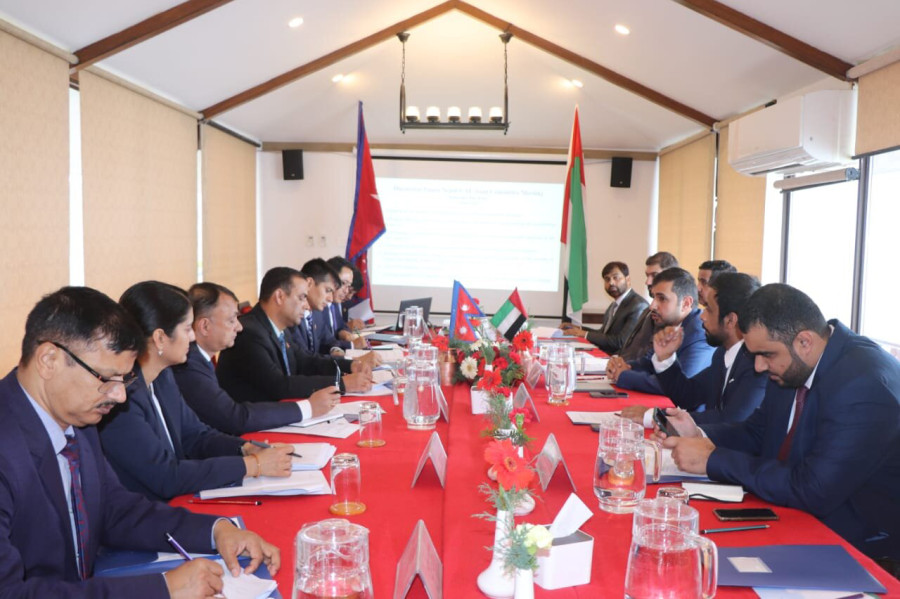Money
UAE requests Nepal to resume sending domestic helpers
On Wednesday, Nepal and the UAE renewed the labour deal, which paves the way for the resumption of sending domestic workers to the Gulf nation more conveniently.
Pawan Pandey
The United Arab Emirates has requested Nepal to resume sending domestic helpers after it renewed the labour deal.
On Wednesday, the two countries renewed the bilateral labour agreement for the next four years. Nepal and the UAE signed the first labour agreement in 2007.
Nepal has yet to agree with the UAE’s proposal, pending approval by the Cabinet.
Rajeev Pokharel, joint secretary at the Ministry of Labour, Employment and Social Security, who led Wednesday's negotiation on the Nepali side, said the delegation from the UAE informed that they have passed a new law to protect the rights of domestic workers.
“We have been requested to begin the process of sending Nepali domestic helpers to the UAE.”
In 2017, Nepal imposed a ban on Nepali women taking up jobs as housemaids in the Gulf countries as part of a bid to protect them from potential exploitation.
The ban was enforced as instructed by the parliamentary International Relations and Labour Committee.
After the ban, concerns were raised as rights activists and organisations said such a ban infringes upon an individual’s right to mobility. The decision had put the government in a dilemma as to what it should do.
After the ban, Nepalis started to seek illegal corridors, mainly from India to reach the Gulf nations for work. Hordes of Nepalis started to travel to the UAE on a visit visa and started working there.
In 2020, the parliamentary Commerce, Labour and Consumer Welfare Committee directed the government to allow Nepalis to work as domestic helpers in the Gulf nations.
But the government imposed seven pre-conditions for labour migration.
The set of conditions, which was also criticised, was meant to ban women migrants in particular, who took informal and unsafe routes to work as domestic helpers.
There were more restrictive measures.
In March last year, the Department of Immigration issued a 17-point regulation to address visit visa-related issues.
Among the provisions, only those individuals who have a record of travelling to the Gulf twice in the past are allowed to go there on a visit visa.
Nepalis going abroad on visit visas have to submit an academic certificate of passing at least 12 classes and should have an annual taxable income of Rs500,000 and half of the amount should be in a bank account.
At Wednesday's meeting, the Nepali side negotiated to guarantee a minimum wage for Nepali workers in the UAE, making repatriation of bodies of workers who die in the UAE to Nepal easier and providing details of Nepali workers imprisoned in the UAE.
The Nepali side also asked to provide details on undocumented Nepali workers and facilitate their return home, according to the ministry officials, who were in Wednesday’s meeting.
While the UAE side was positive to address the concerns raised by the Nepali side, assistant under secretary Abdulla Alnuaimi of the Ministry of Human Resources and Emiratisation, who led the UAE side, said they were eager to hire domestic workers from Nepal.
“Alnuaimi requested the Nepali side to move the process of sending domestic workers to the UAE,” reads the statement issued by the labour ministry on Wednesday.
According to Pokharel, the protocol, which the two countries signed in 2020 contained a provision for sending domestic help to the UAE.
“We informed them of the necessary conditions we have set regarding the safety of domestic workers,” Pokharel said.
The joint working committee meeting held in Abu Dhabi in March last year discussed issues regarding the social security of Nepali workers in the UAE, workplace safety, arrangement of health service and insurance, skill development, salary increment, and resolving issues of Nepalis who had gone to the UAE on tourist visas and were left stranded there.
Though Nepal has signed Memoranda of Understanding (MoUs) with Malaysia, Mauritius, Jordan and the UAE to institutionalise the employer pays principle, employers and recruitment agencies continue to charge migrant workers exorbitant amounts in recruitment fees and related costs, insiders say.
Also known as the zero-cost model, the employer pays model makes the employers responsible for all the fees and costs of labour migration, including the service charges of recruiting agencies for facilitating the hiring process.
The 56th Annual Report of the Auditor General in 2018-19 also raised concerns regarding the proper implementation of the ‘employer pays’ scheme and its monitoring.
“To implement the employer pay model, the meeting has decided to form an online medium for establishing direct contact between the employers and workers, especially in the hospitality and caregiving sector,” Pokharel said.
Earlier in 2015, the government of Nepal introduced the free-visa, free-ticket policy for Nepali workers migrating to Malaysia, Qatar, Saudi Arabia, United Arab Emirates, Kuwait, Bahrain and Oman.
The highly ambitious provision had aimed to obligate employers from the seven labour-receiving countries to bear the cost of visa processing and air tickets to hire workers from Nepal, in order to prevent workers from falling into debt bondage by taking loans at a high-interest rate to finance their recruitment.
Under the scheme, workers needed to pay Rs10,000 to recruiting agencies in service charges, only if their employers refused to bear the cost.
A public interest litigation was also filed at the Supreme Court in August 2017, demanding the effective implementation of the ‘free-visa, free ticket’ policy.
The Supreme Court in 2019 issued a directive to the government to adopt appropriate measures to effectively implement the scheme.
Despite all the efforts, the scheme has so far remained on paper.
The government has recently formed a task force to study the effectiveness of the free-visa, free-ticket policy amid pressure from private recruitment agencies to increase service fees.
As many as 94,379 new and reentry labour approvals have been issued for the UAE in the first 10 months of the current fiscal year.
UAE has been the top destination for women workers from Nepal.
Around 39 percent of the labour approvals received by Nepali women in the last fiscal year for foreign jobs was for the UAE, according to the Nepal Labour Migration Report.
Nepal has so far signed bilateral labour agreements with 10 countries–Qatar, South Korea, Bahrain, Japan, Jordan, Malaysia, Mauritius, the UAE, Israel and the United Kingdom.
While the process for signing bilateral labour agreements with Germany and Romania has reached the final stage, Nepal has also been trying to sign such agreements with Saudi Arabia and Kuwait.
“We have sent the drafts for the labour agreements with Germany and Romania to the Cabinet seeking its in-principle approvals,” said Pokharel. “The foreign ministry has informed us that Saudi Arabia has sent some comments on the draft we had sent them for signing a new labour agreement.”
“The process has also begun to sign an agreement with Kuwait,” Pokharel added.




 23.2°C Kathmandu
23.2°C Kathmandu














